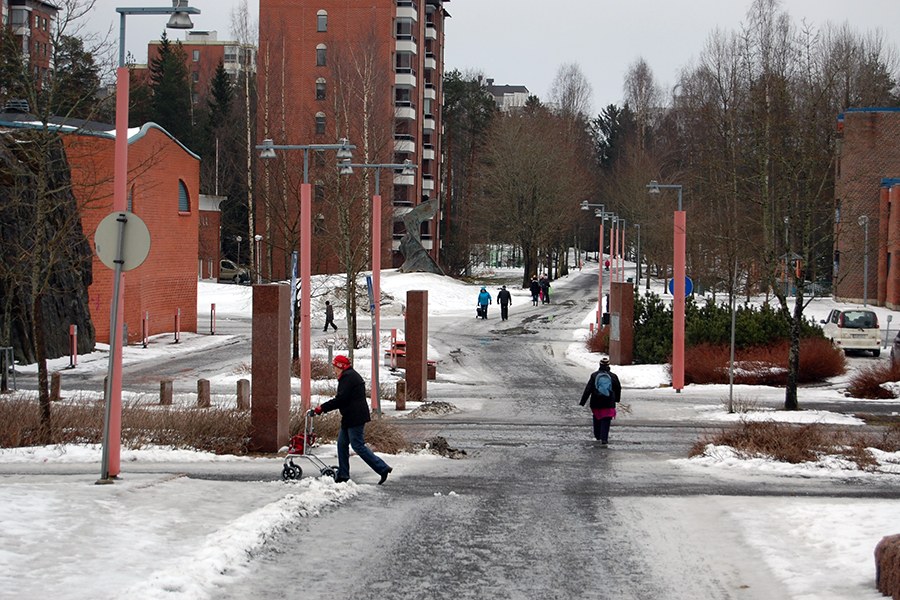Covid-19 highlights older people’s mobility needs

“The ability to access places and seeing other people is not only nice but a fundamental human right. I would like the Covid-19 pandemic to increase the understanding of how vital it is to secure everyone access to other people and events even when they have restricted mobility,” Luoma-Halkola says.
Luoma-Halkola and Häikiö studied how older people organise their independent daily life and moving around in situations where they experience mobility limitations. Their research article on the topic is based on group discussions with older people living in a suburb of Tampere. Häikiö is a professor of social policy and Luoma-Halkola a doctoral researcher at Tampere University.
Independent living requires interdependence
Finland applies the international ageing in place policy, which aims to promote the independent living of older persons in their own homes for as long as possible. Independence is the ideal and, to some extent, it is pursued and considered a prerequisite for successful ageing. On the other hand, dependence is often regarded as something negative that should be avoided.
However, restricted mobility and lack of support may lead to independence turning into isolation, which is why the researchers are talking about interdependence as a basic requirement of independent life.
In Luoma-Halkola’s and Häikiö’s article, the main idea is interdependence, which means that independent living and mobility are formed in a relationship with the living environment, other people and the services provided by society.
“It is not just a question of individual abilities or characteristics; independence arises from dependencies,” Luoma-Halkola says.

Dial-a-ride buses to nature trails
Satisfying mobility needs is not just a matter of the service system for older people but also of urban planning.
A key issue in Luoma-Halkola’s and Häikiö’s study was the city’s dial-a-ride buses which provide a means of transportation for those who cannot walk long distances or use regular public transport or a car. The bus provides door-to-door transportation within a specific service area, and passengers are assisted in boarding and disembarking as needed.
Another essential thing is close people who help and support older people to run their daily life. Nature and moving around in nature, which many had been forced to give up, was also highlighted as a highly valued thing. Thus, one of the development measures could be accessible nature trails with transport to them.
However, the physical impediments of homes and the living environment may be an obstacle. Sills, stairs and the lack of a lift can make it difficult to move around. The good winter maintenance of footpaths would be especially important because winters can be long in Finland.
“The dial-a-ride bus provides access to the shopping centre, but could it also provide access elsewhere and support well-being and activity? We should look at the urban environment from the perspective of people who have mobility difficulties,” Häikiö says.
Many things in the social and health services for older people are related to costs and money. In recent years, participation opportunities have been invested in, showing that the need to support and strengthen ageing is understood more widely.
“Many things are related to costs and money and much could be saved in the service provision for older people if urban planning considered different situations better. In this way, services might be developed in another manner so that the lack of everyday mobility would not increase the care needs so much,” Häikiö points out.
Accessible environments benefit all
Access to hobbies does not always require physical movement. During the Covid-19 epidemic, various remote services have become more common such as Zoom gyms where people get a guided exercise session in their own home and social contacts with other people at the same time.
Häikiö has found that people are creative in developing solutions for their daily lives when unexpected situations arise.
“Imagination is also quite important. From the point of view of well-being, it is important to be able to listen to and interpret sounds, for example, from one’s balcony. Imagination can help overcome the inconveniences caused by obstacles to movement,” Häikiö notes.
Luoma-Halkola adds that mobility should be understood widely. It is important for people to get to the shops, but at the same time it is also important to be able to be a part of the world, see the sceneries, meet people and just get away from the four walls.
“Accessible environments benefit all because unexpected things can happen to anyone,” Luoma-Halkola says.
Text: Heikki Laurinolli





